There's a good chance that you've heard that the vulgar expression "to daven" (to pray) is derived from the Aramaic word for "of the fathers," the point being that Talmudic tradition ascribed the three daily prayers to the Patriarchs.
Here are two pages in Artscroll's Shemoneh Esrei - Inspirational expositions and interpretations of the weekday Shemoneh Esrei by Rabbi Avrohom Chaim Feuer.
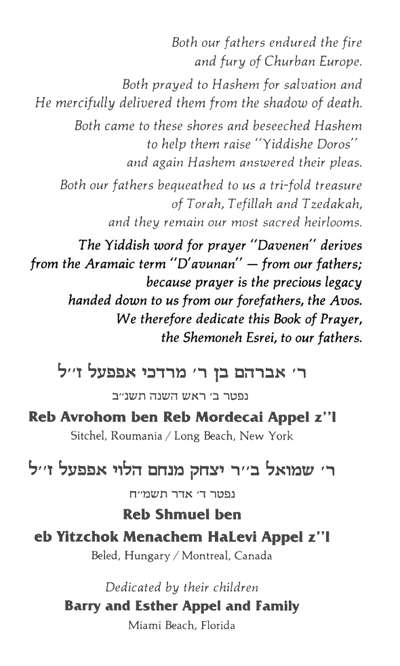

As you can see, the first page is a dedication, presumably composed by the donors. It says "The Yiddish word for prayer "Davenen" derives from the Aramaic term "D'avunan" - from our fathers," while on page 50 the author writes that "Prayer is so closely identified with our forefathers that it is popularly called davenen, a corruption of the Aramaic terms d'avuhon, of our fathers." Thus, in the same book we have the suggestion that "davenen" (or "davening," as English speakers now call it) comes from דאבונן or דאבוהון. Neither comes with a source (although you might expect one from the body of the book rather than the dedication) although in my humble opinion the dedication people at least picked the form of the Aramaic word that sounds a whole lot more like davenen and makes a little more sense linguistically ("our father" versus "their fathers").
In Rabbi Dovid Cohen's exceedingly interesting and exceedingly unusual work Safah Yiddish Ha-kedosha ("The Holy Yiddish Language") we find the following:

Thus, Rabbi Cohen agrees with the dedication, דאבונן over דאבוהון, although he helpfully changes it to the plural, to make it come from "our fathers." It's unfortunate that he spelled it with YIVO Yiddish though, since it glaringly highlights how unlikely such an etymology really is - at least if it's spelled like that.
The truth is though that, fortunately for this etymology, in the early sources it is not spelled with all the Yiddish double vavs and ayins. It is indeed ב-based, if I may coin such a term. There's no need for me to give those sources. Are they not written in in Judah A. Joffe's 1959 article The Etymology of "Davenen" and "Katoves"? (PAAJR v.28)
Naturally the first place to look for such a word is in early Yiddish lexicons, or since it's from Aramaic, surely the Tishbite Elijah Bachur (whose 462nd jahrzeit was very recently) would mention it in one of his books, even if only to make fun of it. However, no such thing occurs. Joffe gives two early sources ("earliest so far known to us," speaking in 1959) , one from 1595 and one from a book written by a woman who died in 1550, but first printed in 1609. I don't know what crafty scholars of this word have dug up since, but I am sure a whole crop of 13th century "davenens" have not. So let us assume that it begins to appear in the 1500s. In these early sources the word is spelled דבנין. But of course there was no such thing as an official way to spell Yiddish words, and therefore a source from 1695 spelled it דאוונן.
In any case, my opinion is that it is difficult to imagine how a word corrupted from Aramaic actually arose so late. Who would have thought to term prayer "דאבונן" in the first place? And there's no trace of it, except for the appearance of the term already corrupted? Unlikely, I think.
This theory did not pop up in Brooklyn. As you can see, it was discussed in the letters section of the Jewish Chronicle in March of 1913:
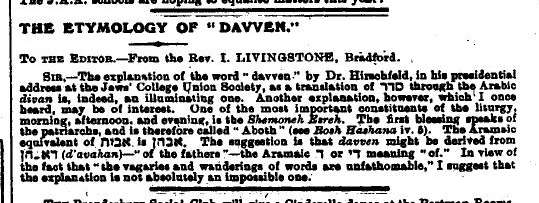
Of course no one really knows its origin, and anyone who tells you otherwise is just picking their pet theory, and there have been many, none really more plausible than the Aramaic theory. Here's another one from two weeks later:
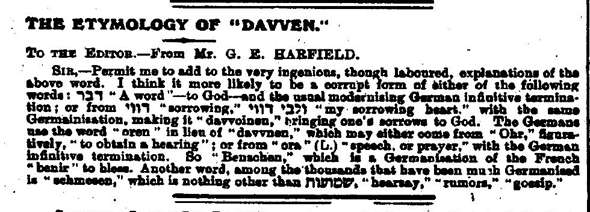
One which I love - although it is obviously wrong - appears in Yitzchak Baer Levinsohn's book Beis Yehuda (oh, how I would have loved this book when I was a yeshiva bochur. One can only imagine how exciting it was to read this book 170 years ago when it appeared).
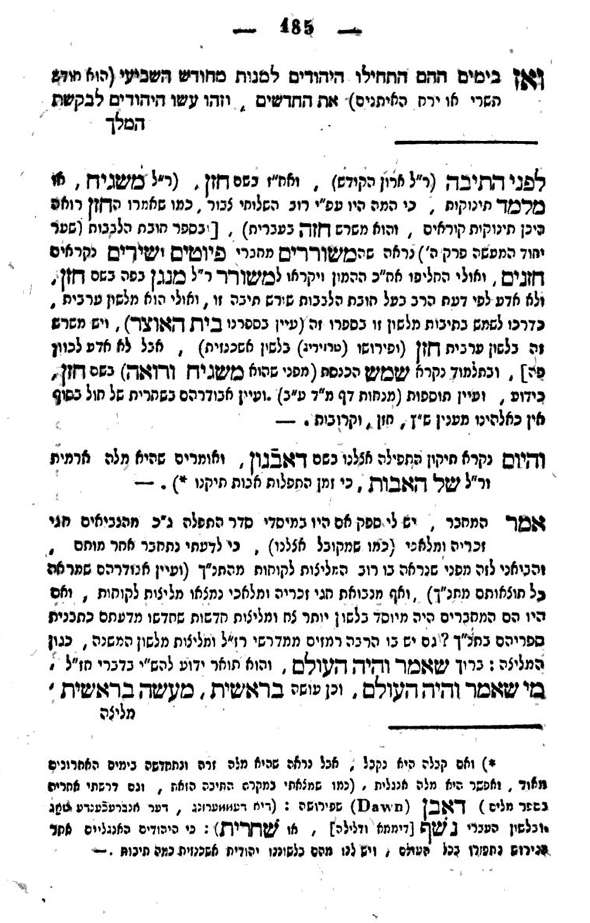
Free translation:
Nowadays the fixed prayers are called by us דאבנון (he, in Russia, is well aware that in Central and Western Europe it is still called "Oren," not "Daven"). They say that this word is Aramaic, meaning "of the fathers," since the times of prayer were established by the Patriarchs.
Then he footnotes:
If this is a correct tradition, then we will accept it. But it seems to me that this is a strange word, coined only relatively recently. It is possible that it's an English word (for which I find support in how it's pronounced, as I expound in my lexicon) דאבן (Dawn), which means (the dämmerung, the breaking of the day, or in Hebrew נשף [of the day and night], or שחרית) : for after the expulsion, the English Jews dispersed all over Europe, and we received many words from them in our language, Judeo-German.
Unfortunately Levinsohn did not say who "they" are who say it's Aramaic, and I couldn't find anyone prior to him who was saying it. Maybe it was said orally, or maybe I just didn't find it.
But regarding his theory, of course I recognize the weaknesses, not the least of which is that creating a term from "to dawn" is not even slightly more plausible than "of our fathers." But I love this one because - well, readers of this blog can probably guess why. Yet Joffe felt it was so bad ("sheer nonsense") that he apparently did not even want to name the one who proposed it. Joffe pointed out that "the older form was related to dagan, daybreak. The proponent did not know that the "w" was silent."
I feel that this needs further explanation. A source that I find to be relatively accurate, and certainly an excellent point of departure, is the Online Etymology Dictionary, which is compiled by Douglas Harper, who writes that he is not a linguist, but "compiler of the works of the professionals in the discipline." This is indeed the case. What you will see in this OED is sound information, insofar as it is all derived from competent scholarly sources.
So the entry for dawn (v.) reads
late 15c., shortened or back-formed from dawning, dawing (c.1300), from O.E. dagung, from dagian "to become day," from root of dæg "day" (see day). Probably influenced by a Scandinavian word (cf. Dan. dagning, O.N. dagan "a dawning," Ger. tagen "to dawn"). Related: Dawned; dawning. The noun is first recorded 1590s.
The Jews were expelled from England in 1290. They obviously didn't bring a word which didn't exist until centuries later with them. Here is a good place to mention the g/ w interchange, which is not some kind of secret route to avoid traffic on the George Washingston Bridge. I don't doubt that many have wondered why the city of Worms appears as "Vormayza" (וורמיזא) and "Gormayza" (גרמיזא) in Hebrew sources. The answer is really rather simple, and it's the same reason why the name William is Guillaume in French, or a French-derived English word like warranty is garantie in French. The W and G switch in these languages. Worms is the German Jewish pronunciation, and Gorms is the French. This may - or may not - also serve as incidental proof that medieval Jews pronounced the ו like the English /w/, but I'm not betting on that one. In case one wonders where that -ייזא suffix came from, the medieval Latin name for the city was Vormatia.
Thus, we see the consonant switching properties of /g/ and /w/ and evidently some such process brought about "dawning" from the Old English "dagung," which in turn produced "dawn," but only much too late.
As for the matter of whether Levinsohn did or did not "know that the "w" was silent," I must come to his defense and suggest that Levinsohn surely knew that in 1839 the "w" was silent. Why should he have assumed it was silent many centuries earlier? On the contrary, a basic rule of thumb in English is that although the written language is full of silent letters today, they were almost all pronounced at some point. Indeed, no one was so stupid as to compose such ridiculous spellings, as people often assume was the case in English. The pronunciation of words changed faster than the spellings, and by the time anyone paid attention enough to try to change the spellings to conform with the pronunciation, it was too late and no one was interested in spelling reform.
Ultimately Joffe proposes something that to my mind is most likely correct, although the fanciful scenarios he proposed to set the tone for it are a little over the top. Go to Google Translate enter the word gift, translate the word to Latvian or Lithuanian and out pops "dāvana" or "dovana" which one can plainly see sounds a whole lot like "daven." Since one of the prayers happens to mean "gift" (or "offering") in Hebrew, namely the afternoon prayer מנחה, one can hardly ignore this. Since Joffe knew that to just say it raises questions, he tried to establish common scenarios where Jews engaged in business transactions prayed while gentile visitors were in their home or place of business. His theory is that they would excuse themselves, using the term "davana" by way of explanation. "Pardon me, I'm going to excuse myself for my afternoon 'offering." He does indeed show a couple of instances in literature, but I hardly think that's necessary.
To come full circle, while this one seems convincing to me, אם קבלה היא נקבל.
Incidentally, the aforementioned woman whose book (מנקת רבקה) was first published in 1609 is Rivka of Tiktin. Wagenseil refers to her and quotes from her book (Sota pg. 420). As you can see, he calls this learned woman Rabbina Rebeca, Rabbi Rebecca:
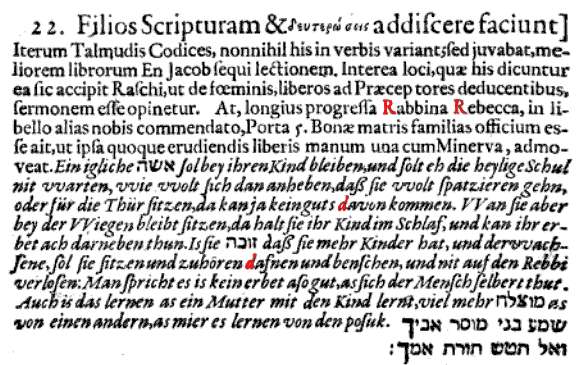
Readers interested in the other etymologies that have been proposed should read Joffe's article, as well Balashon's post. Hartwig Hirschfeld, who was a big Arabic scholar felt it came from "diwan," and seemingly everyone picks the one that - shockingly - is closest to their field. Thus it is hardly surprising that Masseches Berachos 26b should be source of what seems to be the official Orthdox etymology (even if no two people can agree on the precise Aramaic form).
I'm sure the latest Yiddish scholarship has made it to be the Khazar word for drink a l'khaym or something, but they can keep it.





Has anyone thought that it may come from the same root as the words divine & divinity? After all, via the Mitzvo of Tefilo we are accepting Hashem as our King, from whom we receive gifts & punishment.
ReplyDeleteI have heard this theory from Reb Zalman Schachter-Shalomi.
DeleteThe Medieval Ashkenazim pronounced ו as [v], just as the Tiberian Masoretes did, and just as Ashkenazim do today.
ReplyDeleteHowever, the Germanic |w| was still [w], and there was no sign to indicate this in the Hebrew of the time -- just as there was no way to indicate it in the Latin of the time. So, w- got indicated as |gu| (pronounced gw-), in Latin and the Romance languages, and as ג in Hebrew.
Somewhat ironically, the German [w] eventually changed to [v], in the 15th or 16th century.
The Tiberian Masoretes pronounced ו and ב רפא identically? Convince me.
ReplyDeleteYekkishe Bekishe, yes, that's one of the many proposed etymologies.
Ah, S, wonderful post. I would like to think that when you are not blogging, you are teaching Jewish history in a university or in a high-caliber high school to adoring and enthralled students. You would be the best teacher ever!
ReplyDeleteS, it's stated explicitly in Hidāyat al-Qāri, a descriptive work by a Masorete in 10th-11th century Palestine.
ReplyDeleteGreat post!
ReplyDeleteWikipedia mentions "divine" and Slavic "davat" (give) in addition to the Aramaic.
ReplyDeleteI just heard R' Steinsaltz say "daf," as in to flip pages, but he sounded somewhat tongue in cheek.
Mar Gavriel,
ReplyDeleteCan you please quote the Hidāyat al-Qāri? Thanks. Also, IIRC the preserved parts of this work were never published in entirety. Which edition are you using?
Somewhere I once read that "daven" came from the French term "Office Divine," referring to worship at set times. I found this description of the English equivalent "Divine Office" on an Anglican website:
ReplyDelete"By the ninth century the canonical
hours (divisions of time), also called canonical offices, were well-established into seven or
eight daily services, referred to as The Divine (or Daily) Office. Although different worship
traditions vary the number and symbolism of the services, there is consistency and
commonality. For many the liturgical day begins with the service at sunset (based on Jewish
tradition) and proceeds through the night and following day."
They borrow a bissel from us, we borrow a bisssel from them... it seems plausible to me.
Shimon S,
ReplyDeleteYou can read a Hebrew translation, generally known as הוריית הקורא, here. I haven't found what Mar G is referring to yet.
The truth is, Mar G is supported - even without this - by the fact that many of the early grammarians spelled sheva with a vav or a bet interchangably.
S.,
ReplyDeleteIsn't that just an abridged and heavily edited medieval translation? The original (those parts that were found) is still mainly in manuscripts.
I was hoping there is some new critical edition around...
Yes, but maybe it has the relevant passage in Hebrew.
ReplyDeleteI think Ilan Eldar published a critical edition, see here.
In Yivo and standard Yiddish the word is spelled davenen or davnen (and not davinen) :
ReplyDeleteדאַ'װענ|ען/
דאַװנ|ען
About the etymology, it would be better to rely on recent Yiddish linguists and not to retain fantasmatic theories. Take e.g. D. Katz : ".. many unconvincing etymologies have been proposed... One of the more plausible is Kosover's..., a middle High German etymon, doenen 'sing', backed up by Yiddish manuscript evidence" (1991. A Late Twentieth Century Case of Katoves).
Recent isn't necessarily better or more convincing. Why is doenen more convincing than davana? Why does the word first appear in a Slavic, rather than Germanic context? I think no one knows, some are more likely than others is the most reasonable position.
ReplyDeleteS.: It's farfetched (*) to suggest that Jews would translate "mincha" as "gift" and then tell these early Latvians that they are about to offer a gift. It's far more likely that they simply used whatever the local word for a prayer service was. Wouldn't these Latvians themselves have used the official Church terminology to describe their own prayer services? If so, it explains why they'd have used a Latin word and why Jews would have echoed it.
ReplyDelete(*) A Yiddish word presumably constructed from the English word "fetch", a double or apparition, in the sense that an argument is no more convincing than a mirage.
Ok. Not "recent" but "serious"...
ReplyDeleteAnd what is the connection to 'dovdevan' (or is that a BenYehuda word?)
ReplyDeleteYekkishe Bekishe and Dan Klein are correct. It comes from the French, "l'office divine"--meaning "worship."
ReplyDeleteR. Steinsaltz is most convinced by the theory that daven comes from "daf" [Hebrew for 'page'] (the v in daven and the f are interchanged, as is often the case in East European languages with similar sounding syllables). Daven refers to the pages of one's siddur that one turns. R. Steinsaltz was speaking about how being "religious" is not the same as being "observant" - and whereas an observant Jew davens three times a time (that is, turns the pages), he doesn't necessarily "pray". [Heard at a lecture at the Great Synagogue, Jerusalem, 2 February 2011.]
ReplyDelete>S.: It's farfetched (*) to suggest that Jews would translate "mincha" as "gift" and then tell these early Latvians that they are about to offer a gift. It's far more likely that they simply used whatever the local word for a prayer service was. Wouldn't these Latvians themselves have used the official Church terminology to describe their own prayer services? If so, it explains why they'd have used a Latin word and why Jews would have echoed it.
ReplyDeleteI didn't say it isn't. Or, more accurately, I didn't say someone else can't find it farfetched. My position is that we don't really know, and what one finds convincing one finds farfetched. Of course some are likelier than others. The reason why I happen to think that the 'offering' scenario is somewhat plausible is because I have often found that Jews translated Hebrew words hyperliterally in ways in which we wouldn't think to do. It is conceivable that the thought of using the *same* word used in the Church for prayer was repugnant to these Jews (and don't say, what about benschen - that word didn't originate in eastern European Yiddish).
Shimon S,
I have no idea why my comment didn't post, but I had written that Ilan Eldar published what appears to be a critical edition and translation (link.
Anshl, fair enough!
Isn't the relationship to "divine" blindingly obvious? I mean, sure, the obvious etymology is not always the correct one, but shouldn't this be the first place to look?
ReplyDeleteThe idea that it came from French is truly strange. What was the French influence on east European Jews in the 16th century? Western and Central European Jews said "orenen," not "davenen."
ReplyDeleteMilhouse, why is that the first place to look? Did it arise in an Orthodox or Catholic area? Seems that should be answered before we assume that "divine" takes priority, and we would still have to explain the vowel shifts.
And, although I admittedly think it's weak, if the first to discuss it thought it was from Aramaic, why isn't that the first place to look?
As a Christian who has davened at the Western Wall, I would like to know the origin of the knee bending, head bobbing, camel riding motions used when davening.
ReplyDeleteAnon, know one really knows, but the earliest clear reference to it is in the Kuzari, which is about 900 years old. Since the author didn't know why - he gave two reasons - it is apparent that it is even older than that. The reasons he gave were the one which he said was what was commonly believed, in order to "arouse heat" in the body. Of course that's not really a reason. The reason the author himself conjectures was that at an earlier time people had to share books, and they would sway back and forth to enable each other to have a look and read.
ReplyDeleteOther reasons have been given, but all long, long after the fact. In short, it's an old practice, at least 1000 years or more. It's pretty easy to get socialized into doing it, especially if you started at a young age. Once you do it its hard not to.
Ilan Eldar has translated many parts of the Hidāyat al-Qāri. Much of it is in his book. The part relevant to this, on the pronunciation of letters, in not in the book, but is in an article he published in Leshonenu in 1981. REally all it says is that vav, like pay, bet and mem, are prounounced fromteh lips. In a footnote, he says that the tiberians used both pronunciations based on other comments in the Hidāyat al-Qāri. It was usually [v], but in some phonological circumstances, esp. when preceded or followed by and [oo] vowel, it was [w]. E.g., the name Puvah would have been Pu'wah. Geoffrey Khan follows Eldar in this in his papers on Tiberian phonology, and also cites the Hilufim of bA and bN, which I did not have a chance to check today
ReplyDeleteI was at that speech of R' Steinsaltz and I don't think he was entirely serious, as I wrote above. For one, I think the use of the word predates widespread use of bound prayer books.
ReplyDeleteMDJ -- yes. The [w] pronunciation was used in special phonological circumstances, and indicated in the Keter by a dot in the letter. Note how the Keter writes "vihishtaḥawu". (I'll look for an image b"n.) That dot marks the unusual pronunciation; the default one was [v].
ReplyDeleteIn Babylonia, on the other hand, vav was always [w].
Nachum: Codices have been the usual form of books since the early Middle Ages. Scrolls were certainly long out of fashion by the 1500s, which (according to S) is the likely origin-period of the word "davenen".
ReplyDeleteThe earliest prayer books we have, e.g. from the Geniza, are codices, perhaps single-section pamphlets like the earliest haggadah reprinted in Goldschmidt's haggadah, but definitely folded and sewn paper.
I remember seeing in 1 of the Seforim of the Bnie Yisoscher that the word Davenen comes from Avinen
ReplyDeleteD'Avignon
ReplyDeleteIts the davenin of the Age of Aquarius
ReplyDeletePrayer - Tefilot - as we know it, was instituted in place of korbanot, the daily sacrifices in the Temple (one of which - the mid-day one - was called Mincha - to which you refer simply as Gift). Perhaps all prayer was then called after the mid-day Korban.
ReplyDeleteMar,
ReplyDeleteWhere have you seen reference to this dot? I have never heard of it, and looking on line at the one instance of "vhishtachavu" that I can think of (end of Ps. 99) I see no dot.
MDJ -- I have responded to you by personal email.
ReplyDeleteS. -- see Eldar's book on the Hidāyat al-Qāri, in the series אסופות ומבואות בלשון.
I know this website provides quality dependent
ReplyDeletearticles and additional data, is there any other web page which gives
such stuff in quality?
Also visit my homepage ... ford Ranger Forum